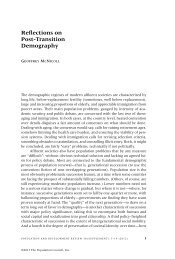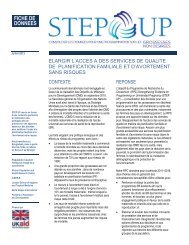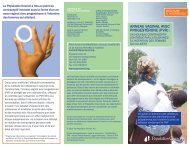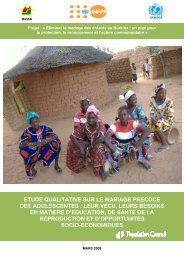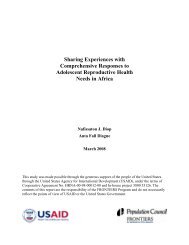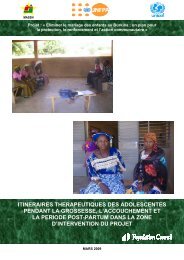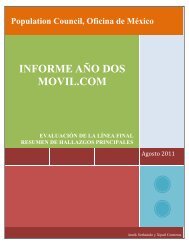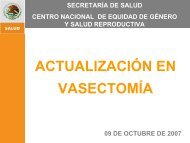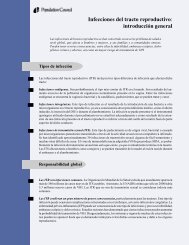Community Health Volunteer's Training Manual - Population Council
Community Health Volunteer's Training Manual - Population Council
Community Health Volunteer's Training Manual - Population Council
Create successful ePaper yourself
Turn your PDF publications into a flip-book with our unique Google optimized e-Paper software.
Preface<br />
iv<br />
The <strong>Community</strong>-based <strong>Health</strong> Planning and Services (CHPS) initiative is the Government<br />
of Ghana’s strategy to bring quality health care to the door step of the people. The<br />
government recognises that the main producers of health are individuals and households. By<br />
involving individuals and households in planning and delivering health care, CHPS aims to<br />
establish sustainable systems for improving the community’s health. <strong>Community</strong> <strong>Health</strong><br />
Volunteers (CHVs) and Village <strong>Health</strong> Committees (VHCs) serve as the link between<br />
the community and the health care system. They work alongside the <strong>Community</strong> <strong>Health</strong><br />
Officer (CHO) who lives in the community.<br />
Since CHPS started in 2000, various training programmes and activities have been done for<br />
volunteers by the Ghana <strong>Health</strong> Service (GHS) and other partners. Yet by 2006 a survey<br />
funded by the CHPS Technical Assistance project (CHPS-TA) revealed that volunteers<br />
lacked the basic knowledge and skills to do their work effectively. This was due mainly to the<br />
fact that there was no manual to guide the training and the training had not been systematic.<br />
Accordingly, in collaboration with the Ghana <strong>Health</strong> Service, the CHPS-TA project has<br />
developed this training material for <strong>Community</strong> <strong>Health</strong> Volunteers (CHVs) and Village<br />
<strong>Health</strong> Committees (VHCs). Though <strong>Community</strong> <strong>Health</strong> Volunteers and Village <strong>Health</strong><br />
Committees perform different roles, they are both called health volunteers and will be<br />
referred to as such throughout this <strong>Manual</strong>.<br />
There are three objectives for writing the volunteer training manual. First, the manual serves<br />
as a set of resource materials that health managers can use to train community volunteers.<br />
Secondly, it helps make the training of health volunteers more systematic and standardised.<br />
Third, it provides skills to volunteers to improve teamwork, develop their personality and<br />
improve attitudes for health promotion and community development.<br />
There are four (4) Modules in the <strong>Manual</strong>, each of them is developed based on the<br />
recommendations of a survey on volunteers conducted by CHPS-TA project. Because most<br />
volunteers could not read and write, the language used in the <strong>Manual</strong> is simple and easy to<br />
read and understand. Based on the findings of the study the contents of the modules are<br />
generally adequate to fill the knowledge and skill gaps of volunteers.<br />
The four Modules are titled<br />
•<br />
•<br />
•<br />
•<br />
Module 1: The CHPS Concept and Volunteerism<br />
Module 2: <strong>Community</strong> Mobilisation and Tools<br />
Module 3: The Work of the Village <strong>Health</strong> Committees (VHCs)<br />
Module 4 : The Work of the <strong>Community</strong> <strong>Health</strong> Volunteers (CHVs)<br />
Modules 1 and 2 give an overview of the CHPS concept, its origins, the framework and<br />
structures and an explanation of the concept of volunteerism and what volunteers need to be<br />
effective community health mobilisers.



